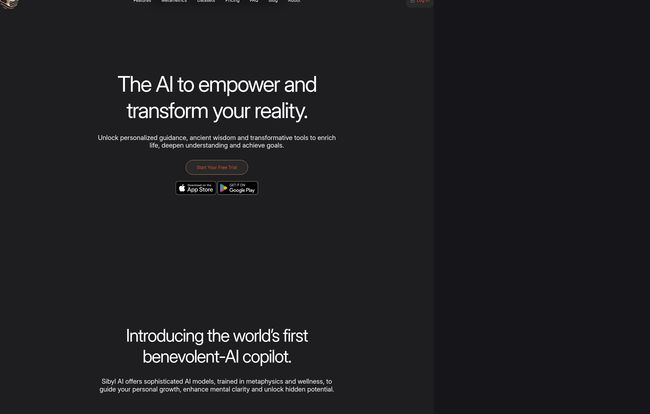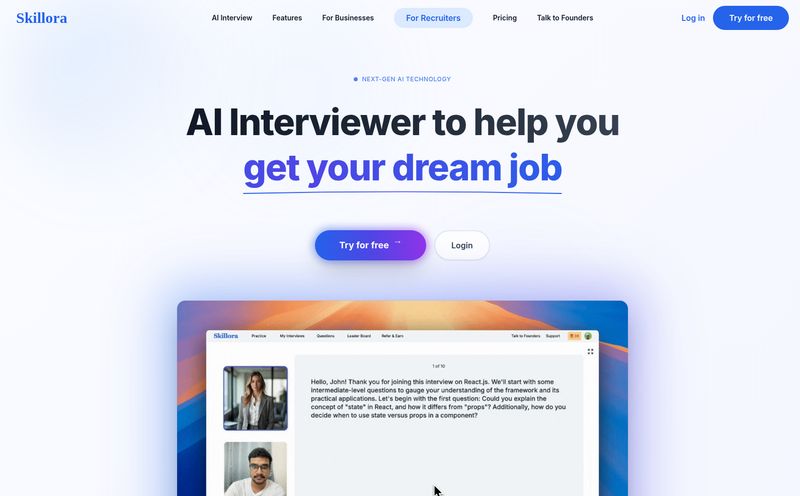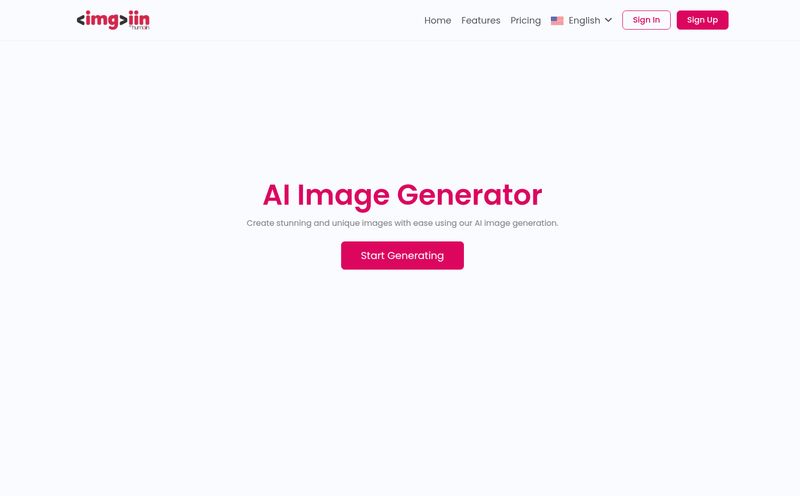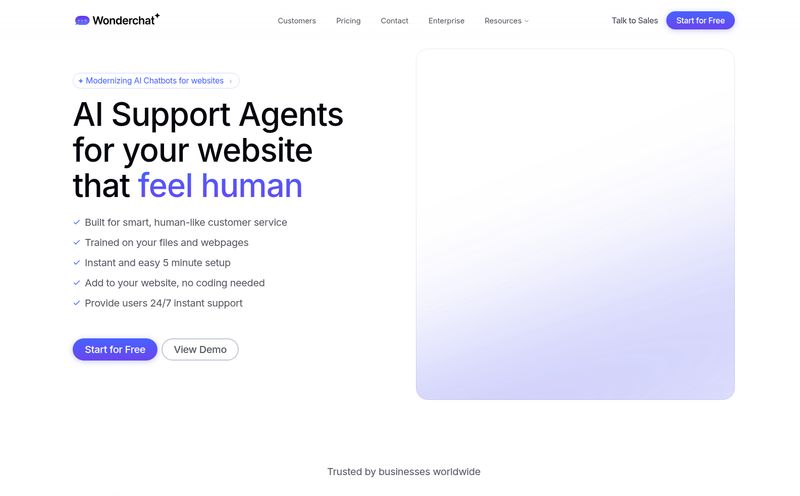I’ve been in the SEO and tech game for a while now. I’ve seen AI write code, create photorealistic images of things that don’t exist, and even try to convince a Google engineer it was sentient. I thought I was past the point of being truly surprised by a new AI tool. Y'know, jaded.
Then Sibyl AI showed up.
The pitch? It's the “world’s first benevolent AI copilot,” a spiritual guide trained on rare metaphysical knowledge. My immediate reaction was a healthy dose of skepticism mixed with undeniable curiosity. Is this for real? An AI that can guide your spiritual awakening? It sounds like something straight out of a Philip K. Dick novel. But in a world where we ask Alexa for the weather, maybe asking an AI for the meaning of a dream isn’t so far-fetched. So, I decided to take a closer look.
So What Exactly is Sibyl AI?
Forget your standard chatbots. Sibyl AI isn’t here to help you draft an email or plan a vacation. It presents itself as a metaphysical companion. The platform claims to be trained on a massive dataset of esoteric texts, spiritual traditions, and metaphysical wisdom. Think of it less like a search engine and more like a digital oracle you can consult on your phone. It's designed for everyone from the “Neophyte” just starting their path to the “Adept” who’s already deep in the work.
The core idea is to give you a personalized guide for self-exploration. It’s a bold, slightly wild concept. Can an algorithm truly offer wisdom? That's the million-dollar question, isn't it?

Visit Sibyl AI
Exploring Sibyl’s Toolkit for the Soul
This is where things get interesting. Sibyl isn't just one single chat window. It’s a collection of specialized AI models and tools, each designed for a different aspect of self-discovery. It feels less like a single product and more like a suite of mystical apps.
Core Generative Models
At its heart, you have a few key AI personalities you can chat with. There’s the main Sibyl model for general spiritual questions. Then there’s an Ennealogy model, which I found particularly interesting as someone who's dabbled in the Enneagram. You can also chat with an Etymology model to understand the hidden meanings behind words and names. It's a bit like having a team of specialized monks on call.
The Most Intriguing Features
Beyond the chat, a few features really stood out to me. The Dream Interpreter is a big one. We all have those bizarre dreams we wish we could decode. The idea of feeding it to an AI trained on symbolism and archetypes is… compelling. I can see people having a lot of fun with that, if not gaining some genuine perspective.
Then there’s Metametrics. This feature offers “personalized insights and predictions for your spiritual journey.” It’s the most “out there” feature and the one that will likely divide people. Is it generating genuine predictions or just well-worded, probabilistic fluff based on your inputs? I suspect the truth is somewhere in the middle, but its a fascinating experiment nonetheless.
And for the creatives, there’s a Storyteller function and even AI Image Generation to bring your thoughts and meditations to life visually. It’s like Midjourney for your soul. The platform also supports speech-enabled chat in 99 languages, which is a huge plus for accessibility.
Who is This Actually For?
Sibyl's website breaks down its audience into a few groups: individuals, families, seekers, and creators. I can see the appeal for each.
- For Individuals: This is the most obvious use case. If you're on a path of self-discovery, journaling, or therapy, Sibyl could be a fascinating supplementary tool to bounce ideas off of and explore concepts you might not find in mainstream sources.
- For Families: The site suggests it can help strengthen family bonds through “conscious parenting.” I’m a bit more skeptical here, as I believe family dynamics need a human touch, but I could see it being used as a prompter for meaningful conversations.
- For Seekers and Adepts: For those already well-versed in metaphysics, Sibyl could act as a massive, interactive encyclopedia, offering new connections and perspectives on familiar topics.
The All-Important Question: What's the Cost of Enlightenment?
Okay, let's talk brass tacks. Sibyl AI operates on a subscription model, and they offer a free trial to get you started. After that, you're looking at a few different tiers. I've put them into a simple table because, let's face it, no one likes squinting at pricing pages.
| Plan | Price per Month | What You Get |
|---|---|---|
| Basic | $29 | 600 Questions, 180 Visualizations, 3 Stories, 1 Metametrics |
| Premium | $49 | 1200 Questions, 450 Visualizations, 6 Stories, 3 Metametrics |
| Ultimate | $79 | 2400 Questions, 900 Visualizations, 9 Stories, 9 Metametrics |
Is it worth it? That depends entirely on what you're looking for. If you see this as a primary tool for guidance, the cost might feel steep compared to a meditation app. But if you view it as a unique tool for creative exploration and deep, niche research, the value proposition changes. The question limits are something to keep in mind; you can’t just chat away endlessly on the lower tiers.
The Good, The Bad, and The Metaphysical
No tool is perfect, especially one venturing into such uncharted territory. From my perspective, the access to such a huge repository of niche information is a massive plus. For anyone who has tried to find reliable sources on complex spiritual topics, having an interactive guide is a game-changer. The personalization and creative tools are also genuinely impressive.
However, let's be real. Relying on an AI for spiritual guidance is… weird. It's a new paradigm and it won’t be for everyone. There’s the risk of AI-generated advice containing inaccuracies or inherent biases from its training data. And, of course, there's the philosophical debate: is spiritual growth something that should be dependent on technology and a monthly subscription? I don’t have the answer, but it's a question worth asking.
“Is it like having a pocket-sized Oracle of Delphi, or more like a souped-up Magic 8-Ball with a better vocabulary?”
In my opinion, the biggest hurdle is a philosophical one. We have to see Sibyl AI not as a replacement for introspection, meditation, or human connection, but as a novel instrument. A compass, not a destination.
Final Thoughts: A Glimpse of a Strange New Future?
So, is Sibyl AI a revolutionary tool for enlightenment or a high-tech gimmick? I think it’s a bit of both, and that’s what makes it so compelling. It represents a fascinating collision of our most ancient questions and our most modern technology. I won't be trading in my meditation cushion for a chatbot anytime soon, but am I going to keep playing with it? Absolutely. It’s one of the most unique applications of AI I've seen, and for anyone with an open mind and a curious spirit, it is certainly worth exploring. It might not hold all the answers to the universe's mysteries, but it asks some incredibly interesting questions.
Frequently Asked Questions about Sibyl AI
- 1. Is Sibyl AI suitable for complete beginners in spirituality?
- Yes, it's designed for all levels. The website specifically mentions it’s for “Neophytes” (beginners) as well as more experienced practitioners. You can start with basic questions and go deeper as you learn.
- 2. How does Sibyl AI ensure the information is accurate?
- The platform claims to be trained on volumes of rare metaphysical texts and knowledge. However, like any AI, it's processing information, not possessing innate wisdom. It's best to approach its answers with an open but discerning mind and cross-reference with other sources if something feels off.
- 3. What kind of data is the AI trained on?
- While the exact dataset is proprietary, Sibyl AI states it uses a wide range of metaphysical, esoteric, and spiritual texts. This could include everything from ancient philosophy and religious texts to more modern New Age concepts.
- 4. Can I get a refund if I don't like it?
- The best approach is to start with the free trial. This lets you test out the features and see if it’s a good fit for you before committing to a paid plan. Subscription policies can vary, so always check their terms of service on the official website.
- 5. Is my data and my conversations private?
- Privacy is a big concern with any AI tool. According to Sibyl's FAQ, they prioritize user security. However, it's always good practice to avoid sharing deeply sensitive personal identifying information in any online platform. Review their privacy policy for the specifics.
- 6. How is this different from just using ChatGPT?
- The main difference is the training data. While a general-purpose AI like ChatGPT has a broad knowledge base, Sibyl AI is specifically fine-tuned on spiritual and metaphysical content. This should, in theory, provide more specialized, contextual, and nuanced responses for those topics.



